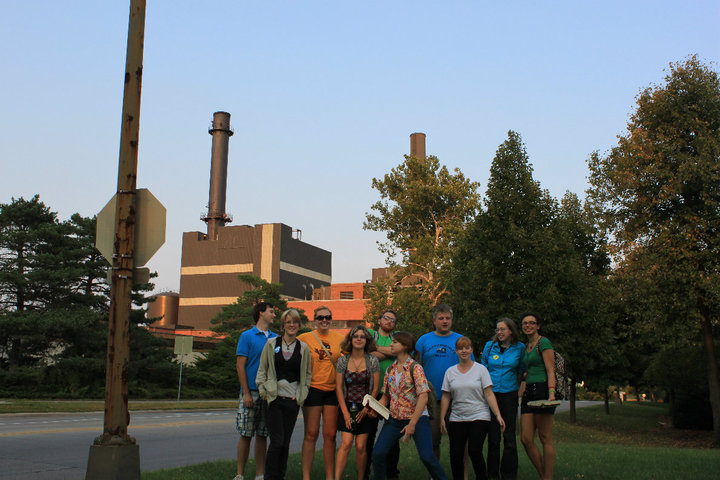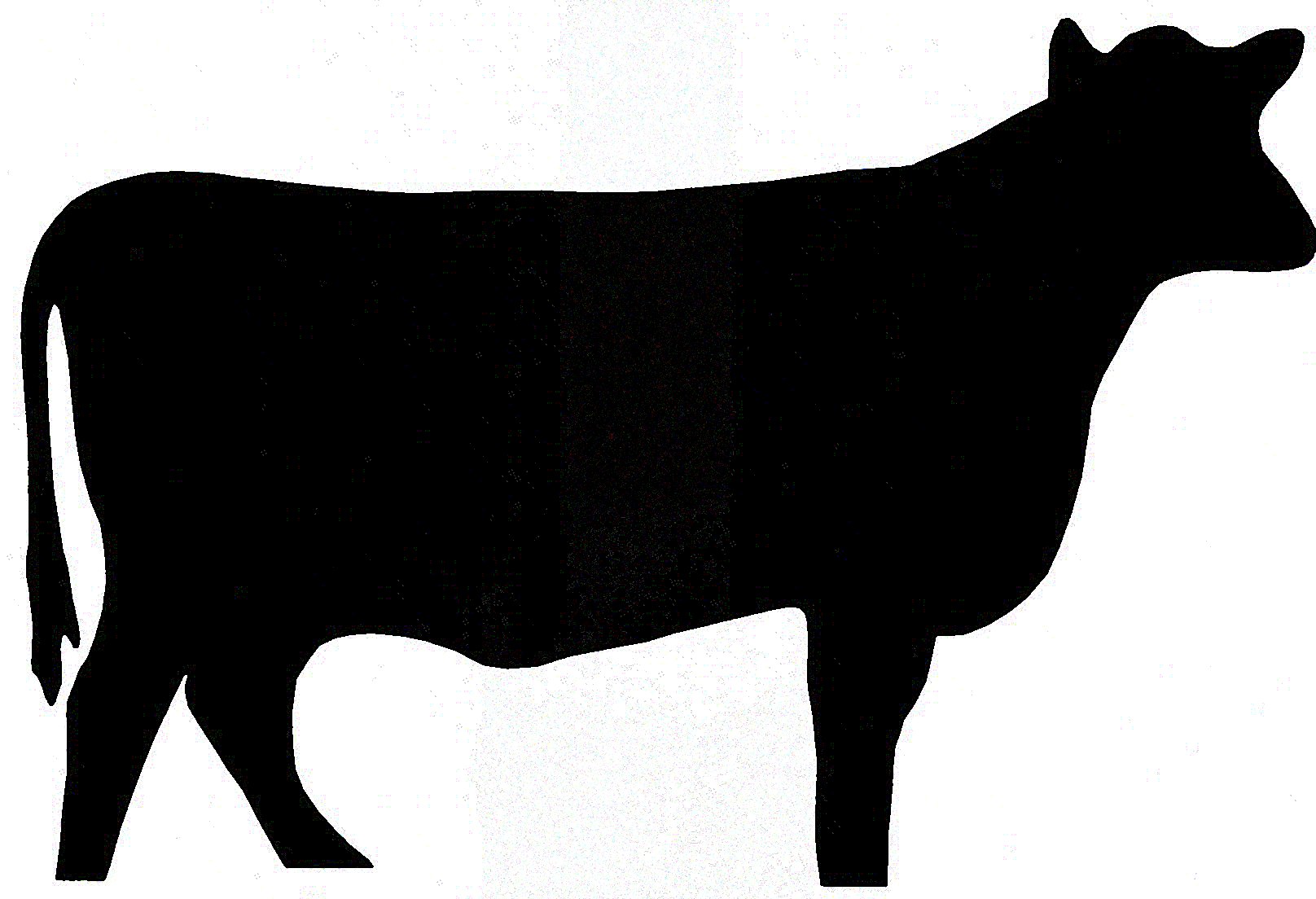A team of Sierra Club members - Steve Veysey, Larry Stone, Wally Taylor - along with the Chapters Conservation Program Coordinator Jess Mazour have been digging into the issues surrounding the Supreme Beef factory farm in Clayton County. The Bloody Run Creek watershed, where the factory farm is located, is riddled with sink holes due to the porous karst geology. It is also the site of one of Iowa's few Outstanding Iowa's Waters, a designation for unpolluted water. It is also a destination for trout fishing, drawing people from across the state. Bloody Run Creek should be protected from harm caused by a factory farm. Yet, this team has uncovered numerous problems with the Nutrient Management Permit that the Department of Natural Resources issued which authorizes Supreme Beef to deposit its manure on the farms fields near the creek and its watershed. The Sierra Club is continuing its work in protecting Bloody Run Creek.
Thank you to the team working on the Supreme Beef issue, to those who have commented to the Department of Natural Resources, and to those who have donated toward this work.
Pam Mackey Taylor, Chapter Director and Newsletter Editor
What you can do to help the environment
-
If you fish for trout in Bloody Run Creek in Clayton County, Iowa, or enjoy being near the Creek, please let us know. Send an email to iowa.chapter@sierraclub.org.
- If you would like to participate in Iowa’s Beyond Coal team phone calls and projects, contact Emma Colman at emma.colman@sierraclub.org.
- Take some time to enjoy Iowa's outdoors. Spring is a wonderful time to hike, picnic, paddle, and visit the state's rivers, parks, and recreation areas.
In this issue of the Iowa Sierran
Agriculture and Factory Farms
Coal plants in Iowa
-
Iowa State University Campus Coal Plant transitioning to gas in 2025. Photo, at right, is the ISU coal plant and coal activists.

-
Sierra Club sends gift basket with letter calling on new MidAmerican CEO to retire coal plants & plan for 100% clean energy
-
Sierra Club welcomes new employee -- Emma Colman
Water
Legislation
Plus
- Contribute to the Iowa Chapter
- Volunteer for the Iowa Chapter
- To see the archive of previous Iowa Chapter newsletters
- To see the White Pine Needle newsletter
Where's the Beef? Where Shouldn't the Beef Be?
Poorly located Supreme Beef factory farm battle continues
The Sierra Club Iowa Chapter, Iowa Environmental Council, Steve Veysey, and Larry Stone filed a petition for hearing with the Environmental Protection Commission (EPC) challenging the Supreme Beef Nutrient Management Plan (NMP) approved last month by the Iowa Department of Natural Resources (DNR). Less than 24 business hours later, the AG notified us that the EPC is refusing to take our case.
The 11,600 head Supreme Beef feedlot sits near the headwaters of Bloody Run Creek and most of the manure fields drain into the Creek. Bloody Run Creek is one of Iowa’s few Outstanding Iowa Waters, which require stronger protection under the State’s Antidegradation Rule. The area is riddled with sink holes due to the karst topography. Karst is extremely porous and will readily funnel water and pollution into the aquifer.
Sierra Club Iowa Chapter claims that DNR approved an incomplete and incorrect NMP despite being made aware of the errors during the official public comment period. DNR approved the application because of behind the scenes political pressure and collusion between Supreme Beef, State Senator Dan Zumbach and DNR Director Kayla Lyon; and a lack of political will and capacity to take on Iowa’s growing CAFO crisis.
After a failed attempt at constructing the feedlot in 2017 due to environmental violations, public pressure, and legal and financial troubles, Supreme Beef owner Jared Walz resubmitted an  application for 11,600 beef cattle feedlot in August 2020. A group of environmentalists pointed out errors in the August application which resulted in DNR sending a letter on October 2, 2020, stating that Supreme Beef must withdraw their application or have their application denied.
application for 11,600 beef cattle feedlot in August 2020. A group of environmentalists pointed out errors in the August application which resulted in DNR sending a letter on October 2, 2020, stating that Supreme Beef must withdraw their application or have their application denied.
In an Open Records Request, it was discovered that later that same day - October 2 - collusion behind the scenes started. Jared Walz called his father-in-law State Senator Dan Zumbach, who is not his State Senator. Senator Zumbach then called DNR Director Kayla Lyon. Although it is not known what was said during those conversations, the result was partial approval of the application – for 2750 cattle.
In February 2021, Supreme Beef resubmitted an application for an additional 8900 cattle, for a total of 11,600 head. DNR approved the application – ignoring approximately 100 public comments in opposition, including comments from the Sierra Club, Iowa Environmental Council and others that it was filled with errors.
DNR did acknowledge some of the errors in the Nutrient Management Plan which resulted in two manure fields being removed from the plan because of incorrect calculations, but a majority of the errors were ignored by DNR during the approval process. These errors, left unaddressed, pose an imminent threat to cold water trout streams in the area, including Bloody Run Creek, one of Iowa’s few Outstanding Iowa Water Bodies. Steve Veysey, a retired ISU chemist, has been doing a majority of the complex calculations in the Nutrient Management Plan review. When DNR failed to address the most serious errors in the NMP, he submitted another Open Records Request to identify any conversations, calculations, or justifications as to why DNR ignored a majority of the claims. The Open Records Request returned little new information, although there was enough to allow Steve to find yet another calculation error that should disqualify yet another field. The absence of any substantive record that DNR investigated serious concerns expressed by Mr. Veysey, Sierra Club Iowa Chapter, and Iowa Environmental Council leads us to believe that DNR approved the application because of political pressure despite known errors; or the possibility that many conversations regarding the NMP deficiencies were via private email, phone conversations or other means to avoid the public record.
The purpose of a Nutrient Management Plan is to determine how much manure a facility will produce and to determine how much manure each field can safely receive. Under state law, fields with a high P-index are required to reduce the amount of manure applied to the field or ban manure application on the field altogether. Phosphorus pollution is one of the leading causes of algae blooms on lakes, rivers and streams. Iowa has seen an increase in algae blooms all across the state in the last decade. It is imperative that NMP calculations are accurate to ensure that manure does not pollute Iowa’s waters. DNR is required to abide by environmental regulations for Animal Feeding Operations in Chapter 65 of the Iowa Code and Departmental Rules to determine if the calculations are done properly and that the manure does not pose a risk.
There are still dozens of errors in the NMP despite the EPC refusing to hear our case:
- The manure storage structure is not appropriate for a cattle feedlot
- Supreme Beef is under-calculating the amount of manure it will produce resulting in 1.3 million pounds of Nitrogen and Phosphorus that are unaccounted for
- When the correct amount of manure produced is taken into consideration, there are not enough acres to receive manure for the site
- Manure fields do not have a current soil test, as required by Iowa law, to determine the existing amount of Phosphorus in the soil
- The NMP claims that many of the manure fields will receive manure and commercial fertilizer but does not factor the commercial fertilizer tillage into the RUSLE2 soil loss prediction.
- The NMP only accounts for two types of erosion, Rill & Interrill erosion, leaving out Ephemeral Gully and Classical Gully erosion. Ephemeral Gull and Classical Gully erosion are critical to determine how much phosphorus will run off with the soil erosion.
- The NMP failed to accurately calculate the distance from the center of the field to the nearest perennial or intermittent streams on 13 fields
- 3 fields have a P-index greater than 5 and more fields may be above 5 if proper ephemeral gully erosion is included in the calculations - fields with a P-index greater than 5 cannot receive manure until appropriate conservation practices have been established to reduce the P-index to 5 or below
- 98% of the manure fields are Highly Erodible Land (HEL) and manure should not be applied on fields with greater than 10% slopes that have no soil erosion control practices, as referenced in IAC 65.35F and IAC 65.112(8)
- 92% of the manure fields have phosphorus soil test results in the High or Very High range - they do not need any more phosphorus and Iowa law recommends it not be increased - this shows how manure is not being treated as a nutrient, but rather a waste product
- DNR should have done an antidegradation review for facilities that will likely cause degradation of water quality - Bloody Run Creek is an Outstanding Iowa Water entitled to a Tier 2.5 protection under Iowa’s Antidegradation Policy
- DNR should have used their authority established in Iowa law to deny this NMP based upon a careful consideration of environmental factors.
Based on these points, it should be presumed that Supreme Beef will discharge pollutants to the waters of the United States. DNR never should have approved this plan, as was their initial intention until the collusion happened between Senator Zumbach and Kayla Lyon.
Sierra Club Iowa Chapter and Iowa Environmental Council believe this problem goes beyond Supreme Beef. DNR does not have the capacity to complete adequate reviews of NMPs and Manure Management Plans for over 10,000 factory farms in Iowa. Iowa’s 2020 impaired waters report shows that 61% of rivers and streams and 67% of lakes and reservoirs that DNR tested are impaired. The leading causes of those impairments point directly back at factory farm manure. Indicator bacteria (E. coli), biological impairments, fish kills, algal growth, turbidity, and pH impairments can be directly tied to factory farm manure and poor field practices.
“We are currently reviewing the DNR’s response and will consider all possibilities for future action,” stated Wally Taylor, Legal and Conservation Chair for the Sierra Club Iowa Chapter.
Click the links below to view the official petition for hearing filed with the DNR and denied by the EPC and Attorney General’s Office:
Supreme Beef Petition for Review
Appendix A: Veysey Written Comments
Appendix A: Veysey Written Comments Appendices
Appendix B: Stone Written Comments
Appendix C: Sierra Club Written Comments
Appendix D: IEC Written Comments 2021-03-08
Appendix E: Veysey Corrections for the Record
Appendix F: Veysey Clarification Requests
To read the prior blog about Supreme Beef
5 principles of soil health
Soil Health. Regenerative Farming. Carbon Farming. What does this all mean and how does it impact farming here in Iowa?
The commitment to healthy soil has been welcomed by many people including farmers and environmentalists, but like so many good ideas and noble efforts, the focus on one aspect of our life-sustaining biosphere has been too easily co-opted by think tanks, elected officials, and agribusiness interests. With exaggerated headlines such as “building healthy soil solves everything” and “soil is the key to the climate change solution”, and “healthy soil creates beautiful landscapes”, soil health has been reduced to sound bites. But healthy soil is more than a sound bite. 
The United States Department of Agriculture (USDA) estimates that Iowa loses 5.2 tons of topsoil per acre of cultivated cropland every year due to sheet and rill erosion, in essence water erosion.[1] USDA also estimates that Iowa loses 0.5 ton of topsoil per acre of cultivated cropland due to wind erosion.[2] On their own, soils form at an average rate of 0.24 tons per acre, with a range of 0.01 to 0.08 tons per acre, per year.[3] Over half of Iowa’s topsoil has been lost since the land was first cultivated, and over half of the organic material in the soil has been lost.[4]
What this means for Iowa is that cultivated farmland is losing soil at a significant rate every year and that methods need to be introduced to restore the topsoil and to preserve it on the land. Failing to do so will result in a significant reduction in soil fertility, exhausted soil and compacted soil. All of this means that the yield of crops will be significantly reduced. The livelihoods of farmers, the vitality of rural communities, and the production of food for generations to come are all at risk.
When it comes to soil health, there are five principles:[5]
1. Soil cover at all times (soil armor) – Soil cover prevents wind and water erosion. It reduces soil evaporation rates which means that more water is available for plants. Soil cover helps reduce weeds.
2. Minimize physical, chemical, and biological disturbance of the soil – Tillage removes the pore spaces between soil particles, which reduces the infiltration of water, destroys the soil structure, and leads to compaction. Chemicals – herbicides, pesticides, fungicides - can destroy the beneficial web of microbes in the soil. Biological disturbance, such as overgrazing, can reduce soil cover, can cause compaction, and can reduce soil nutrients.
3. Living roots in the soil at all times – Living plants hold carbon in the soil and reduce erosion.
4. Plant diversity – Crop rotations, including small grains and hay, improve the soil microbes, increase the soil fertility, and reduce pests.
5. Integrate animals – Managed livestock help reduce weeds and provide natural fertilizer to the land.
Farmers win when these five principles are integrated into the farming operation. Enriching carbon in soils increases water retention, reduces carbon in the air, and increases soil fertility and crop yields. Another benefit is storing carbon, thus keeping it out of the atmosphere, helps to mitigate climate change.
When you look around Iowa, most of the land we see has not implemented any of these principles. And we wonder why we have problems with soil erosion and water quality!
You can learn more about soil policy by viewing the "Panel Discussion: Digging into Soil Health - A New Vision for Agriculture", Presenters are Denise O'Brien, Dr. John Ikerd, Dr. Francis Thicke. The panel discussion was sponsored by the Iowa Chapter of the Sierra Club as part of our Earth Day 2021 activities. You won't want to miss looking at this insightful discussion.
Photo with this article is courtesy of the USDA NRCS.
[1] U.S. Department of Agriculture, “Summary Report: 2010 National Resources Inventory”, Natural Resources Conservation Service, Washington, DC, and Center for Survey Statistics and Methodology, Iowa State University, Ames, Iowa, page 88
[2] U.S. Department of Agriculture, “Summary Report: 2010 National Resources Inventory”, Natural Resources Conservation Service, Washington, DC, and Center for Survey Statistics and Methodology, Iowa State University, Ames, Iowa, page 101
[3] Rick Cruse, “Soil Erosion – What will the future bring?”, Power Point, Iowa State University
[4] Francis Thicke, A New Vision for Iowa Food and Agriculture, Mulberry Knoll Books, 2010, page 8
[5] United States Department of Agriculture, Natural Resources Conservation Service, North Dakota, www.nrcs.usda.gov/wps/portal/nrcs/detailfull/nd/soils/health/?cid=nrcseprd1300631
Update from Iowa's legislature
As I write this, the Republican members of the Iowa House and Senate have not reached a compromise on a major tax overhaul, which has caused the legislature to go into overtime. Legislator’s per diem expense money ended on April 30. Usually the loss of that financial benefit signals to the legislators that it is time to end their work for the session.
We continue to watch proposed bills and amendments for policies that we support and those that we oppose.
To date,
- The Governor signed a bill - SF413 - that is a major overhaul of our election laws and which will result in voter suppression in future elections. The Sierra Club opposed this bill.
- The Governor signed a bill – SF185 - that gets rid of the Missouri River Preservation and Land Use Authority. The Sierra Club opposed this bill.
- The House and Senate each passed a bill that authorizes manure digesters for the largest animal factory farms – HF522. The next step is for the governor to make a decision on the bill. The Sierra Club opposed this bill.
We are continuing to watch the bills we have been working on all session, plus the amendments that are proposed to bills that are brought to the floor of the House or Senate, including
- Small butchery revitalization and exploring an artisanal butchery at a community college or university – Sierra Club supports HF857
- Forest reserve property tax credits and increasing burden on receiving the credit – Sierra Club opposes SF587
- Bottle deposit law changes, increasing the allowable distance to a redemption center – Sierra Club opposes these bills SF470, HF892
- Solar tax credits – Sierra Club supports these bills HF221, HF323, HF674, HF641, SF215
Next month, we will cover in greater the results of the legislative session, assuming that they have completed their work.
Redrawing the legislative maps will happen later this year, once the census numbers have been provided to the states.
Photo is the dome of the Iowa Capitol.
Join us for interesting and informative webinars
Webinars
Every Friday at noon, we do a Lunch and Learn livestream. See us on Facebook at "Sierra Club Iowa Chapter".  These will be recorded so you can watch them anytime. Topics will be selected based on what is happening during the week and will be announced the day before the livestream. During the legislative session, we cover issues coming before the Iowa legislature.
These will be recorded so you can watch them anytime. Topics will be selected based on what is happening during the week and will be announced the day before the livestream. During the legislative session, we cover issues coming before the Iowa legislature.
In case you missed our past webinars and lunch and learn sessions, you can still see them.
We hope you can join us.
ISU campus coal plant transitioning to gas in 2025
By Katie Rock, Beyond Coal Campaign Representative
Who is ready for a coal plant retirement story? We reached retirement #340 earlier this month when Iowa State University was approved to transition its two remaining coal boilers to gas in a $16 million project by the Iowa Board of Regents. What started as a fight to end irresponsible coal ash disposal in a gravel pit near Waterloo, Iowa, turned into years of organizing against the polluting ISU power plant. 
The 45 MW plant has been a target of dozens of student activists and organizers for over 15 years for cleaner air and energy on-campus, including our own Nebraska organizer Graham Jordison. Today, these students and alumni can breathe a little easier knowing their college coal plant will soon be retired.
In my first months with Beyond Coal I had a volunteer sit down with me and pitch her self-written proposal for targeting this plant, still frustrated that her advocacy as a student decades earlier remained undone. At a climate strike in fall 2019, I met a group of ISU students tied to the Climate Reality Project who were organizing against the plant. They sat down with the ISU President, asking her to retire it. I was looking to support these students to ramp up their work when COVID-19 hit. Within months, Iowa State announced plans to pursue a transition.
Years of hard work by folks with the Sierra Club, Sierra Student Coalition, Greenpeace, and ISU student organization Activus, culminated in this victory. So many young activists got their start here. Here are just a few of the people who made this possible: Rivka Fidel, Aly Peeler, Tyler Rygg, Aaron Ostrem, Elisse Lorenc, Elora Hans-Price, Rachel Worth Olsen, Ahna Kruzic, Anna Swenson, Ben Witmer, Brock Pope, Hannah Witmore, Gavin Moore, Nicole, Lucia, Laurito, Rachel Kramer, Rachel Haukkala, Seth Kaduce, Zulsi Huyke, Emili Kathrein, Avery Robbins, David Pinsky, Derek Hauer, Kim Hagemann, Anton Skvoretz and Angela Dunkin.
And to our Iowa team: Katie Rock, Elizabeth Katt Reinders, Andy Knott, Laurie Williams, John Romankiewicz, Sara Edgar, Renner Barsella, Christian O'Rourke, Emma Colman, and Pam Mackey-Taylor. And again - GRAHAM JORDISON - who helped write this story.
Here's just a few of the media hits over the years:
https://www.iowastatedaily.com/news/new-mercury-emissions-report-released/article_715357be-2992-11e0-9073-001cc4c002e0.html
https://www.iowastatedaily.com/news/students-protest-isu-coal-plant-engineer-says-facility-is-efficient/article_ac4406c1-6e14-5e6b-aeaa-abd119811245.html
https://www.iowastatedaily.com/news/activus-promotes-its-beyond-coal-campaign/article_acc3dfe6-d4a4-11df-81d9-001cc4c03286.html
https://blogs.sierraclub.org/ssc/page/11/
https://lib.dr.iastate.edu/cgi/viewcontent.cgi?article=1017&context=iowastatedaily_2012-02
https://who13.com/news/power-play-iowa-state-university-students-are-asking-president-steven-leath-to-end-the-use-of-coal-power-at-the-university/
https://blogs.sierraclub.org/ssc/2010/11/iowa-state-students-run-beyond-coal-.html
Sierra Club sends gift basket with letter calling on new MidAmerican CEO to retire coal plants & plan for 100% clean energy
Des Moines, Iowa -- The new CEO of utility company MidAmerican, Kelcey Brown, received a gift basket with a petition signed by over 1300 Iowans and letters from the Sierra Club Iowa Beyond Coal campaign calling on the utility to commit to a plan to go 100% clean energy.
With a new CEO, MidAm has the chance to catch up with other utilities that are much farther ahead in their transition to clean energy. In a recent scorecard of utility climate plans, MidAm scored a 23/100, or a D, because despite investments in clean energy, the utility has kept five massive coal plants online with no retirement date. Retiring the George Neal North and South coal plants by 2023 would save customers $92 million, improve public health, and help mitigate extreme flooding that has already impacted countless Iowa farmers and families. To become the responsible utility and climate leader they claim to be, MidAmerican needs to make near-term commitments to phasing out coal and investing in clean energy.
“Iowa has weathered multi-billion dollar natural disasters in each of the last two years, and is starting 2021 in a continued state of drought. We know these weather extremes are due to a changing climate, and public awareness of our new climate reality is growing. That is why we are calling for MidAmerican to retire its coal fleet by 2030,” said Katie Rock, Iowa Beyond Coal Campaign Representative.
Photo is Emma Colman delivering a gift basket and petitions calling on MidAmerican to retire coal plants and plan for 100% clean energy.
Sierra Club welcomes new employee -- Emma Colman
Earlier this year, Emma Colman joined Sierra Club as an organizing representative for the Beyond Coal Campaign. She is based in Des Moines. She will be working closely with members, supporters, volunteers, and partner organizations to build grassroots support for clean energy in Iowa.
Emma was born and raised in Des Moines. She went to school in Illinois, and after moving back to Iowa, worked on a small farm in Waukee for several years. When not organizing, Emma enjoys photography, cycling, cinema, and almost anything outdoors.
Iowa’s Beyond Coal team is hosting bi-monthly statewide calls for those interested in getting more involved and learning more about the campaign. Reach out to Emma at emma.colman@sierraclub.org if you would like to join.
Update: Rogue operator at Sioux City Wastewater Treatment Plant sentenced to federal prison
by Pam Mackey-Taylor, Director of the Iowa Chapter of the Sierra Club
A second employee of the Sioux City wastewater treatment plant was given a sentence in federal court earlier this month for his involvement in a scheme to undertreat the wastewater for pathogens, manipulate testing procedures so it appeared that the treatment was adequate, and then falsely report test results. Jay Niday will spend 3 months in federal prison and received a fine of $8,500. His co-conspirator, Patrick Schwarte, was sentenced in 2019 to two years of probation.
In April 2015, a whistleblower alerted the Iowa Department of Natural Resources (DNR) that staff at the Sioux City wastewater treatment plant were discharging partially treated sewage into the Missouri River. That set the stage for an investigation into what was happening. The City of Sioux City and employees of the wastewater treatment plant violated its National Pollutant Discharge Elimination System (NPDES) permit for four years. Under a search warrant, the FBI seized computer data from the city, under the direction of the United States Attorney’s Office for the Northern District of Iowa.
Throughout the summer of 2015, news unfolded that Jay Niday and Pat Schwarte, employees of the Sioux City Sewage Treatment Plant, were manipulating the disinfection process and altering the chlorine, fecal coliform, and E coli test results. At least four other employees were identified as participants in the scheme. The Sioux City Sewage Treatment Plant holds a NPDES permit that covers the discharges from the treatment plant into the Missouri River. That permit defines the levels of treatment that are required in order to meet the federal Clean Water Act. By purposely undertreating the discharge, then altering the levels of chlorine and bisulfate right before the testing, and reporting the jury-rigged test results, the NPDES permit was purposely and intentionally being violated.
The scam involved the following:
- The daily amounts of chlorine and bisulfate added during the treatment process were inadequate to kill E. coli (short for Escherichia coli) and other pathogens. As Kirby Kaufman reported in the Sioux City Journal, the chlorine levels were cut by as much as 88 percent.
- The resulting water, which was not disinfected as required by the NPDES permit, was released into the Missouri River.
- Prior to each E. coli test, the levels of chlorine and bisulfate were increased so that the tests would show satisfactory disinfection.
- Once the E. coli tests were completed, the chlorine and bisulfate levels were readjusted downward.
- When the residual chlorine levels were then tested, they showed proper levels.
- The falsified test results were recorded and reported.

The inappropriate disinfection, the rigging of chlorine and bisulfate levels so that the E. coli and residual chlorine tests would show proper disinfection, and reporting of the fraudulent results occurred over several years.
This is not merely a technical violation. The chlorine treatment process kills pathogens, including E. coli. E. coli and other pathogens that are released into a water body can sicken anyone who comes into contact with the untreated water. E. coli is a bacteria that can cause bloody diarrhea, anemia, urinary tract infections, kidney failure, and even death. People recreating in or near the Missouri River downstream of the sewage treatment plant could have come into contact with the tainted water, which would have put their health at risk of serious illness. That includes people boating in the river, fishing, and just standing or sitting along the river bank. Also ingesting the water could make a person ill.
Sewage treatment plants are required to obtain a NPDES permit from the Iowa DNR. The permit states the maximum levels of pollutants that are allowed in the final treated water, before it is discharged into a river or stream. In order to protect the public health, permit holders are required to test the water five times per quarter between March 15 and November 15 to verify that they are satisfactorily disinfecting the water.
Both Niday and Schwarte held certifications in waste water treatment; the Department of Natural Resources permanently withdrew those certifications. Because of their professional training and subsequent certifications, both Niday and Schwarte knew what was required to meet the NPDES permit. Both knew enough about wastewater treatment to figure out how to manipulate the test results. Since both were in positions of leadership, power, and authority at the plant, they had the ability to authorize and implement proper procedures. Niday told investigators that the City saved at least $100,000 a year through this scheme.
In October 2015, the Iowa Chapter wrote to the Acting Region 7 Administrator of the Environmental Protection Agency (EPA) and the U.S. Attorney for the Northern District of Iowa “[A]sking that the United States Attorney and the Environmental Protection Agency pursue a criminal indictment against Niday and Schwarte. The actions of the two were clearly intentional and criminal in nature. The manipulation of chlorine levels could gravely affect public health by causing serious illnesses.”
The public expects that sewage treatment plant operators are following the rules and protecting the public health. It is very disturbing to hear about the behavior of these employees. Their behavior was a clear violation of the public trust. The Chapter is concerned that other sewage treatment plant operators are also disobeying their NPDES permits. The criminal indictment and prosecution of Niday and Schwarte will serve as a warning to other communities that NPDES permits compliance is required and that intentionally failing to do so will result in stiff penalties.
Sources
Associated Press, "Man who tampered with wastewater samples sentenced", Cedar Rapids Gazette, April 3, 2021
Alex Boisjolie, “FBI serves warrant for data tied to Sioux City wastewater probe,” Sioux City Journal, December 4, 2016
www.webmd.com/a-to-z-guides/e-coli-infection-topic-overview
Iowa Department of Natural Resources, In the Matter of Patrick Schwarte, Administrative Consent Order, 2015-WW-21
Iowa Department of Natural Resources, In the Matter of Jay Niday, Administrative Consent Order, 2015-WW-22
Kirby Kaufman, “Iowa DNR alleges former Sioux City wastewater employees tampered with samples,” Sioux City Journal, August 17, 2015
Kirby Kaufman, “Iowa DNR: Chlorine levels cut 88% at Sioux City wastewater plant,” Sioux City Journal, August 19, 2015
Kirby Kaufman, “State will not file charges against former Sioux City wastewater plant employees,” Sioux City Journal, September 24, 2015
John Crotty, attorney for Iowa Department of Natural Resources, letter to Jay Niday, August 5, 2015
John Crotty, attorney for Iowa Department of Natural Resources, letter to Patrick Schwarte, August 5, 2015
KTIV.com, “Update: Second Sioux City employee fired amid wastewater investigation,” June 15, 2015
Volunteer for the Iowa Chapter
Almost everything we do is done by volunteers like you. If you would like to volunteer for the Iowa Chapter, please let us know by sending an E-mail to Iowa.chapter@sierraclub.org. Or sign up by using the on-line form. There are many opportunities for you to make a difference:
-
making phone calls
-
developing graphics for banners and flyers
-
working on legislative issues
-
working on elections
-
fundraising
-
organizing events
-
joining an issue committee
If you would like to join a committee on the Peoples Budget, sign up here please fill out our People's Budget Volunteer Form so we can build our organizing team for this project. A large number of Sierra Club issues require some involvement with Iowa's state budget. Budgets reflect theories of government. Iowa’s political conversation rarely moves beyond the notion that government’s primary responsibility is to grow the economy. Hence we give corporations tax breaks, but slash funding for health care, environmental protections and public interest research at our three state universities. We hold a different view of government and that is government is the trustee of all the things we share - public roads and bridges, water, wildlife, air, public universities, state parks, education and public health. Therefore, protecting, enhancing and restoring our shared public wealth is the central responsibility of government. We must tie the budget to our priorities.
If you would like to join our legislative action team, sign up here. Keep on top of what is happening at the Iowa legislature. Be alerted when you should contact your legislators about pending legislation.
If you would like to join the team on a public interest research agenda, send an e-mail to iowa.chapter@sierraclub.org. The Iowa Chapter of the Sierra Club is forming a team to design a public interest research agenda, determine needed policies, and develop a strategy to implement the public research agenda. This project will be a year-long study and design group. We are especially looking for scientists who are working in climate, public health, sustainable agriculture, and related fields.
Contribute to the Iowa Chapter
Sierra Club - our best bet for achieving bold solutions to Iowa’s environmental problems
Sierra Club is Iowa’s oldest and largest grassroots environmental organization. Not only that, we are the best bet in the state for achieving bold solutions to Iowa’s environmental problems.
We work in the courts, before Iowa’s public agencies, and in the halls of the legislature. The Iowa Chapter's effort to protect the environment takes financial support. The Chapter receives very little financial support from the national Sierra Club. Can we count on you for a donation to ensure even more victories? Your contribution will be put to work here in Iowa on issues that affect every day Iowans – water quality, clean air, protection of Iowa's soil, parks and natural areas, and a strong democracy. The Iowa Chapter is relentless in fighting back bad legislation that affects every one of us.
Your non-deductible contributions make it possible for us to fight bad legislation and to promote good legislation. We appreciate your past and on-going support of these efforts. You can make a non-deductible donation with a credit card. A non-deductible donation supports the Chapter's effective, citizen-based advocacy and lobbying programs. If you prefer, a non-deductible check can be written to the Sierra Club Iowa Chapter and mailed to:
Treasurer
Sierra Club, Iowa Chapter
PO Box 1058
Marion, IA 52302
You can also make a tax-deductible donation with a credit card. Tax-deductible activities are limited to public interest education, research and legal actions. A deductible check can be written to the Sierra Club Foundation with “Iowa Chapter” written in the memo line.
Easier yet, become a monthly donor.
Thank you for your support.
Donate your used vehicle
As the Sierra Club Foundation's Iowa Chapter continues to raise charitable funds to support its work in Iowa, won’t you consider participating in our vehicle donation program? Our partners over at CARS have made the process of donating your unused or unneeded car, truck, motorcycle, boat or RV easy, efficient and secure. They’ll take care of everything from picking up your vehicle to sending you a tax receipt for your generous gift. To learn more about The Sierra Club Foundation's Iowa Chapter vehicle donation program, please call 844-674-3772. Or visit our webpage to get started today!
Sierra Club Foundation promotes climate solutions, conservation, and movement building through a powerful combination of strategic philanthropy and grassroots advocacy. The Foundation is the fiscal sponsor of Sierra Club’s charitable environmental programs.
For more information
| When | Earliest: Latest: |
| What |
|
| Word or Phrase | Word or phrase to search for: |
| Leader | All or part of leader name to search for: |
No Matching Activities Found
Loading
| Date | Activity (click title for full description) | Sponsor | Category | Type | Difficulty | Links |
|---|
Loading ...
 Outing
Outing Club support event
Club support event  Social event
Social event  Activist event
Activist event  Multiple events (map only)
Multiple events (map only)